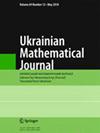Jordan Homoderivation Behavior of Generalized Derivations in Prime Rings
IF 0.5
4区 数学
Q3 MATHEMATICS
引用次数: 0
Abstract
Suppose that R is a prime ring with char(R) ≠ 2 and f(ξ1, . . . , ξn) is a noncentral multilinear polynomial over C(= Z(U)), where U is the Utumi quotient ring of R. An additive mapping h : R ⟶ R is called homoderivation if h(ab) = h(a)h(b)+h(a)b+ah(b) for all a, b ∈ R. We investigate the behavior of three generalized derivations F, G, and H of R satisfying the condition
\(F\left({\xi }^{2}\right)=G\left({\xi }^{2}\right)+H\left(\xi \right)\xi +\xi H\left(\xi \right)\)
for all ξ ∈ f(R) = {f(ξ1, . . . , ξn) | ξ1, . . . , ξn ∈ R}.
素环中广义衍生的乔丹同源行为
假设 R 是质环,char(R) ≠ 2,f(ξ1, ... , ξn) 是 C(= Z(U))上的非中心多线性多项式,其中 U 是 R 的乌图米商环。如果对于所有 a, b∈ R,h(ab) = h(a)h(b)+h(a)b+ah(b) ,则加法映射 h : R ⟶ R 称为同化。对于所有ξ∈ f(R) = {f(ξ1,., ξn) | ξ1, ., ξn∈ R}。
本文章由计算机程序翻译,如有差异,请以英文原文为准。
求助全文
约1分钟内获得全文
求助全文
来源期刊

Ukrainian Mathematical Journal
MATHEMATICS, APPLIED-MATHEMATICS
CiteScore
0.90
自引率
20.00%
发文量
107
审稿时长
4-8 weeks
期刊介绍:
Ukrainian Mathematical Journal publishes articles and brief communications on various areas of pure and applied mathematics and contains sections devoted to scientific information, bibliography, and reviews of current problems. It features contributions from researchers from the Ukrainian Mathematics Institute, the major scientific centers of the Ukraine and other countries.
Ukrainian Mathematical Journal is a translation of the peer-reviewed journal Ukrains’kyi Matematychnyi Zhurnal, a publication of the Institute of Mathematics of the National Academy of Sciences of Ukraine.
 求助内容:
求助内容: 应助结果提醒方式:
应助结果提醒方式:


